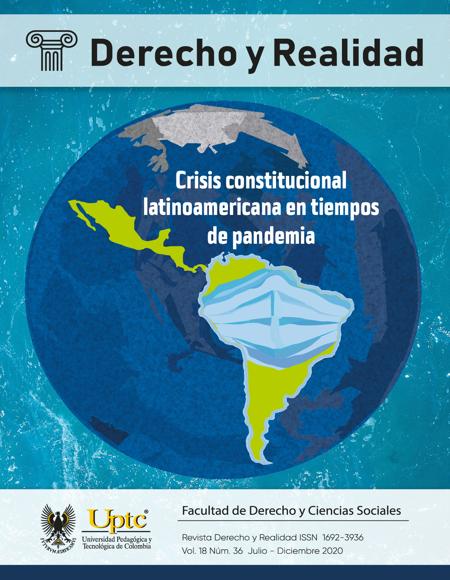Effects during the COVID-19 pandemic, in the mental health

Abstract
The following article aims to establish the effects of the COVID-19 pandemic on mental health with a mixed methodology. It raises the possibility of increased development of mental illness, and with it the crisis in
health systems. As a result of the analysis it was established that mental illnesses, such as depression and anxiety, will have a significant increase during the pandemic, and their effects will continue many decades
after it is overcome. Finally, a projection of the long-term consequences of the pandemicwas made, and it was determined that there is a high probability that 20% of the world's population will develop some form of mental illness as a result of the context generated by the pandemic.
Keywords
Mental health, COVID-19, pandemic, mental illness, crisis
Author Biography
Luisa Cristina Álvarez Ulloa
Administradora Pública. Escuela Superior de Administración Pública.
References
- International Monetary Fund. (14 de Abril de 2020). International Monetary Fund. Obtenido de World Economic Outlook, April 2020: The Great Lockdown: https://www.imf.org/en/Publications/WEO/Issues/2020/04/14/weo-april-2020#Chapter1
- Barden-O'Fallon, J. A. (4 de Agosto de 2015). US National Library of Medicine. Obtenido de Rapid Assessment of Ebola-Related Implications for Reproductive, Maternal, Newborn and Child Health Service Delivery and Utilization in Guinea: https://www.ncbi.nlm.nih.gov/pmc/articles/PMC4542265/
- Bauman, Z. (2007). Vida de Consumo. México: Fondo de Cultura Económica.
- Carod-Artal, F. (2020). Complicaciones neurológicas por coronavirus y COVID- 19. Revista de Neurología, 70 (09): Recuperado 27 de mayo de 2020 de: https://www.neurologia.com/articulo/2020179
- Centers for Disease and Control and Prevention. (2018). Opioid Overdose. Obtenido de Synthetic Opioid Overdose Data: https://www.cdc.gov/drugoverdose/data/fentanyl.html
- Centers for Disease Control and Prevetion. (18 de Mayo de 2020). Centers for Disease Control and Prevention. Recuperado 5 de junio de 2020 de: https://n9.cl/z7sj
- CEPAL. (ABRIL de 2020). América Latina y el Caribe: Proyecciones de Crecimiento 2020 . Recuperado 6 de mayo de 2020 de: https://n9.cl/2inb1.
- Kalmoe, M. C. (junio de 2019). US National Library of Medicine , National Institutes of Health. Obtenido de Physician Suicide: A Call to Action, el 20 de agosto de 2020 de: https://www.ncbi.nlm.nih.gov/pmc/articles/PMC6690303/
- Lai, J., SimengMa, M., YingWang, M., ZhongxiangCai, M., JianboHu, M., NingWei, M., ShaohuaHu, M. (2 de Marzo de 2020). FactorsAssociated With Mental Health Outcomes Among HealthCare Workers Exposed to Coronavirus Disease 2019. Jama Network. file:///C:/Users/Usuario/AppData/Local/Packages/Microsoft.MicrosoftEdge_8wekyb3d8bbwe/TempState/Downloads/lai_2020_oi_200192%20(1).pdf
- Mamelund, S.-E. (Octubre de 2003). Effects of the Spanish Influenza Pandemic of 1918-19, on Later Life Mortality of Norwegian Cohorts Born. ResearchGate. Recuperado 06 de mayo de 2020 de: https://n9.cl/rkicp.
- Ministério da Saúde. (Mayo de 2020). Boletins Epidemiológicos. Recuperado 28 de junio de 2020 de: https://coronavirus.saude.gov.br/boletins-epidemiologicos
- Nutt David, K. L. (24 de Marzo de 2007). The Lancet . Development of a rational scale to assess the harm of drugs of potential misuse. Recuperado 30 de junio de 2020 de: https://www.thelancet.com/journals/lancet/article/PIIS0140-6736(07)60464-4/fulltext
- Organización Mundial de la Salud. (12 de Diciembre de 2017). La salud mental y los adultos mayores. Recuperado 05 de marzo de 2020 de: https://n9.cl/zqvzg.
- Organización Mundial de la Salud. (18 de Mayo de 2020). Salud de la madre, el recién nacido, del niño y del adolescente. Recuperado 05 de junio de 2020 de: https://n9.cl/kv4r.
- Plutarco. (2017). Vidas Paralelas. Menorca, España: Textos.Info.
- Potloc Consumer Research. (16 de Abril de 2020). Potloc Study: Canadian health workers share their insights from the front lines of the COVID-19 pandemic. Potloc. Recuperado 09 de junio de 2020 de: https://n9.cl/m8ep.
- Suzzane, N. (23 de Abril de 2020). Monash University. By the double: COVID-19, opioids, and the threat of a syndemic. Recuperado 03 de junio de 2020 de: https://n9.cl/actss.
- Taubenberger, J. K. (3 de Agosto de 2009). US National Library of Medicine. The Origin and Virulence of the 1918 “Spanish” Influenza Virus. Recuperado 03 de abril de 2020 de: https://www.ncbi.nlm.nih.gov/pmc/articles/PMC2720273/
- The United Nations. (14 de Mayo de 2020). United Nations. Obtenido de COVID-19 and the Need for Action on Mental Health. Recuperado 24 de julio de 2020 de: https://n9.cl/91tnv.
- U.S. Department of Labor. (Abril de 2020). U.S. Department of Labor. Recuperado 9 de mayo de 2020 de U.S. Department of Labor: https://www.dol.gov/
- United Nations. (27 de Marzo de 2020). United Nations. Recuperado 09 de abril de 2020 de Department of Economic and Social Affairs: https://www.un.org/development/desa/ageing/news/2020/03/covid-19/
- United Nations. (15 de Abril de 2020). United Nations. Policy Brief: The Impact of COVID-19 On Children. Recuperado 30 de abril de 2020 de: https://n9.cl/ryko.
- United Nations Population Fund . (28 de Abril de 2020). United Nations Population Fund . Obtenido de New UNFPA projections predict calamitous impact on women’s health as COVID-19 pandemic continues. Recuperado 30 de abril de 2020 de: https://n9.cl/61vo6.
- University College of London. (17 de April de 2020). UCL. Stress over Covid-19 keeping fewer people up at night. Recuperado 30 de abril de 2020 de: https://n9.cl/0qc46.
- Van Bavel, J. (2020). Using social and behavioural science to support COVID-19 pandemic response. Nature, 7.
- Van Hartesveldt, F. (1992). The 1918-1919 Pandemic Of Influenza: The Urban Impact In The Western World. New York: Edwin Mellen Press.
- YoungMinds. (Marzo de 2020). Coronavirus: Impact on young people with mental health need. Recuperado 15 de abril de 2020 de: https://n9.cl/iay5